Gender-specific recruitment in China's 2024 National Public Service Exam: an analysis
Fifth and final installment in our series focusing on the employment conditions of women in contemporary China.
Hi, this is Yuxuan Jia. The 2024 National Public Service Exam in China, targeting a range of positions within the civil service, has set a significant portion of its recruitment to be gender-specific. With 7,322 positions explicitly gender-restricted, there appears to be a notable gender preference in the allocation of civil service roles, favoring male candidates in both the number of positions and vacancies available.
The allure of civil service positions among Chinese youth has notably intensified in recent years amid challenging economic conditions and employment landscapes, marking a significant milestone as the number of applicants for the 2024 National Public Service Exam exceeded 3 million for the first time. Many candidates choose to dedicate themselves full-time to exam preparation post-graduation or even resign from their jobs to focus entirely on their studies.
The heightened attention towards civil service exams makes the scrutiny of gender restrictions within these exams particularly pertinent. The following analysis, originally published on the WeChat blog "equal-employment" on Dec. 11, 2023, is a close-up examination of gender restrictions in the 2024 National Public Service Exam which took place on Nov. 25-26, 2023. This is the fifth and final installment in our series focusing on the employment conditions of women in contemporary China.
China's National Public Service Exam, organized by the National Civil Service Administration, is designed for positions within the central Party and government agencies and their directly affiliated institutions. Targeted at positions up to and including the rank of Level I Section Heads [ranks 21 to 15 within China's 27-tier civil service ranking system, where lower numbers signify higher ranks], the exam typically comprises both written and interview components., with the final score determined equally by both components, each contributing 50%.
Candidates can consult the annual recruitment notice and position list for the National Civil Service Exam to ascertain the number of vacancies offered by each recruiting agency, specific job titles, examination formats, eligibility criteria, and contact information for further inquiries. This article mainly focuses on the gender restrictions outlined in the "2024 Examination and Recruitment Notice for Civil Servants in Central Party and Government and Their Directly Affiliated Institutions" (National Civil Servant Exam Position List).
Gender Restrictions Overview
The 2024 National Public Service Exam aims to recruit 39,561 candidates, with 18,948 positions available to apply. Among these, 7,322 positions are gender-restricted, accounting for 38.64% of the total recruiting position; 18,531 candidates will face gender-restriction, making up 46.84% of the total number of recruitment.
Regarding the positions offered, 4,229 are male-preferred, accounting for 22.32% of the total; 3,093 are female-preferred, accounting for 16.32%. 1,136 more positions favor men than women, and the share is 6.00% higher.
Regarding the number of vacancies, there are 10,981 vacancies with a preference for males, making up 27.76% of the total number; 7,550 vacancies with a preference for females, accounting for 19.08% of the total number. The number of males admitted will exceed the number of females admitted by 3,431, with the relevant proportion being 8.67% higher.
Gender Restrictions by Recruiting Ministries
The distribution of civil servant recruitment for 2024 is as follows:
Central Party organs are offering 136 positions with 219 vacancies, with no positions indicating a gender preference.
Central government organs have 313 positions available, with 564 vacancies. Of these, 65 positions (95 vacancies) are gender-restricted, representing 20.77% of the total positions in this category (and 0.17% of the total number of vacancies). Departments and bureaus that exclusively prefer male candidates for all their positions are predominantly under or directly affiliated with the Ministry of Public Security. This preference is attributed to the roles' "high work intensity and heavy tasks."
Institutions directly affiliated with the central government at the provincial level and below are recruiting for 16,861 positions, with 36,852 vacancies. Among these, 7,088 positions (18,240 vacancies) have gender restrictions, making up 42.04% of the total positions in this category (and 49.50% of the total number of vacancies). There are 4,071 male-preferred positions (10,775 vacancies) and 3,017 female-preferred positions (7,465 vacancies) in fields such as taxation, railway public security, customs, and immigration border inspections. The gender-specific requirements often mention criteria like "a minimum service period of 5 years, male/female," "24-hour shifts, males only," or "front-line positions, females only."
Organizations within the central government managed in accordance with the Civil Servant Law are offering 1,638 positions with 1,926 vacancies, including 169 gender-restricted positions (196 vacancies), accounting for 10.32% of the total positions in this category (and 10.18% of the total number of vacancies). There are 93 male-preferred positions (111 vacancies) and 76 female-preferred positions (85 vacancies), primarily in the Bureau of Statistics and the Ministry of Public Security, with requirements often highlighting "a minimum service period of 5 years, male/female (probation period included)", "high work intensity, frequent overtime, and business trips, males only."
Gender Restrictions by Recruiting Systems
The 2024 National Public Service Exam spans 15 systems, including key areas such as the tax system, the People's Bank of China, customs, the financial regulatory system, the National Bureau of Statistics, railway public security, the Maritime Safety Administration, immigration inspection, the Meteorological Administration, water resources departments, the Securities Regulatory Commission, the Ministry of Public Security/Bureau, the National Immigration Administration, mine safety, and others with fewer than 99 positions. Among these, gender restrictions apply to 9 systems, constituting 60% of the total.
Calculated by the number of positions, the proportion of male-preferred positions and female-preferred positions is fifty-fifty in the tax system, both offering 2881 vacancies; the same situation can be observed in the statistical system, as both male-preferred and female-preferred positions offer 76 vacancies. There are 184 male-preferred positions and 136 female-preferred positions in the customs system; 612 male-preferred positions in the system of public security of railway, 209 male-preferred positions in the immigration inspection system, 114 male-preferred positions in the Ministry of Public Security/Bureau, 96 male-preferred positions in the mine safety system, 45 male-preferred positions in the National Immigration Administration and 12 male-preferred positions in other categories.
Calculated by the number of vacancies, there are 7,224 vacancies with a preference for males and 7,224 vacancies with a preference for females in the tax system; 85 vacancies with a preference for males and 85 vacancies with a preference for females in the statistical system, the number of male-preferred vacancies is equal to those female-preferred vacancies. In the customs system, 301 are male-preferred vacancies and 241 are female-preferred vacancies. There are 2,432 male-preferred vacancies in the railway public security system; 475 male-preferred vacancies in the immigration inspection system; 213 male-preferred vacancies in the mine safety system; 161 male-preferred vacancies in the Ministry of Public Security/Bureau; 76 male-preferred vacancies in the National Immigration Administration and 14 male-preferred vacancies in other categories.
Gender Restrictions by Region
In the 2024 National Public Service Exam, Guangdong Province, Shandong Province, and Henan Province are at the top of the list of the number of positions, offering 1,327 positions (3,325 vacancies), 1,095 positions (2,169 vacancies), and 927 positions (1,837 vacancies) respectively. The provinces with the fewest positions are Qinghai Province, Xizang Autonomous Region, and Ningxia Hui Autonomous Region, with 280 positions (472 vacancies), 205 positions (318 vacancies), and 164 positions (290 vacancies) respectively.
The proportions of gender-restricted positions in total positions are the highest in Yunnan Province, Tianjin, and Hunan Province, reaching 53.46%, 52.84%, and 48.31% respectively. The lowest proportions are in Hainan Province, Beijing, and Xizang Autonomous Region, at 29.34%, 24.47%, and 17.07% respectively.
The proportions of gender-restricted vacancies in total vacancies are the highest in Tianjin, Qinghai Province, and Hunan Province, reaching 66.44%, 57.42%, and 56.05% respectively. Hainan Province, Xizang Autonomous Region, and Beijing have the lowest proportions, which are 27.11%, 25.52%, and 25.15% respectively.
Characteristics of Gender Restrictions
1. Nearly 40% of positions have gender restrictions, accounting for over 40% of the total number of vacancies. The proportion of positions and vacancies with gender restrictions in 2024 has increased compared to the previous year. For the 2024 National Public Service Exam, there are 18,948 recruitment positions involving 39,561 vacancies, with 38.64% of the positions and 46.84% of the vacancies having gender restrictions. In 2023, there were 17,655 positions involving 37,100 vacancies, with 37.73% of the positions and 44.31% of the vacancies having gender restrictions.
2. The preference for men is more obvious than that for women, with 1.32 times as many male-preferred positions as for female-preferred ones, and 1.33 times as many male-preferred vacancies as for female-preferred ones. For the 2024 National Public Service Exam, there are 4,229 male-preferred positions and 3,093 female-preferred positions, with 1,136 more male-preferred ones and a difference of 6% in proportion. The number of male-preferred positions is 1.37 times that of female-preferred ones, and the number of male-preferred vacancies is 1.45 times that of female-preferred ones.
3. Institutions directly affiliated with the central government at the provincial level and below have the most severe gender restrictions in the National Public Service Exam, with over 40% of the positions having gender restrictions, accounting for nearly 50% of the vacancies. In 2024, these institutions offer 16,861 positions involving 36,852 vacancies. Among these, 7,088 positions have gender restrictions, involving 18,240 vacancies, with respective proportions of 42.04% and 49.50%. There are 4,071 male-preferred positions (10,775 vacancies) and 3,017 female-preferred positions (7,465 vacancies).
4. Except for the tax system, customs system excluding the Anti-Smuggling Bureau, and the National Bureau of Statistics which recruit males and females in a 1:1 ratio, other positions with gender restrictions favor males. In these three systems, there are 6,186 gender-balanced positions (15,100 vacancies), while the Anti-Smuggling Bureau, Ministry/Bureaus of Public Security, National Immigration Administration, or for jobs concerning railway public security, immigration inspection, mine safety, among others, have 1,136 male-preferred positions (3,431 vacancies).
5. In 2 provincial-level regions, the share of gender-restricted positions exceeds 50%, and in 12 provincial-level regions, the proportion of gender-restricted vacancies surpasses 50%. Yunnan Province has the highest proportion of gender-restricted positions, while Tianjin has the highest proportion of gender-restricted vacancies. In Yunnan Province and Tianjin, the proportion of gender-restricted positions exceeds 50%, while in Tianjin, Qinghai Province, Hunan Province, Sha'anxi Province, and other 12 provincial-level regions, the proportion of gender-restricted vacancies exceeds 50%. The proportions of gender-restricted positions are the lowest in Beijing and Xizang Autonomous Region, reaching 24.47% and 17.07% respectively. These two regions also have the lowest proportions of gender-restricted vacancies, which are 25.52% and 25.15% respectively.
6. Two bureaus under the Ministry of Emergency Management (MEM) continue to require compliance with the relevant stipulations of the Labor Law regarding special protection for female staff. The recruitment notes of the National Work Safety Emergency Rescue Center and the Mine Rescue Center under the MEM state: "Only males are needed for work in underground mines. Candidates are required to be able to undertake frontline rescue tasks in mining and other accidents and avoid occupational prohibitions on physical and psychological conditions. Candidates should also be able to adapt to being on regular duty, working overtime, and emergency rescue work on-site." (This report regards such requirement as male preference in its calculations)
Check out the previous four installments focusing on the enployment and family situations of Chinese women:





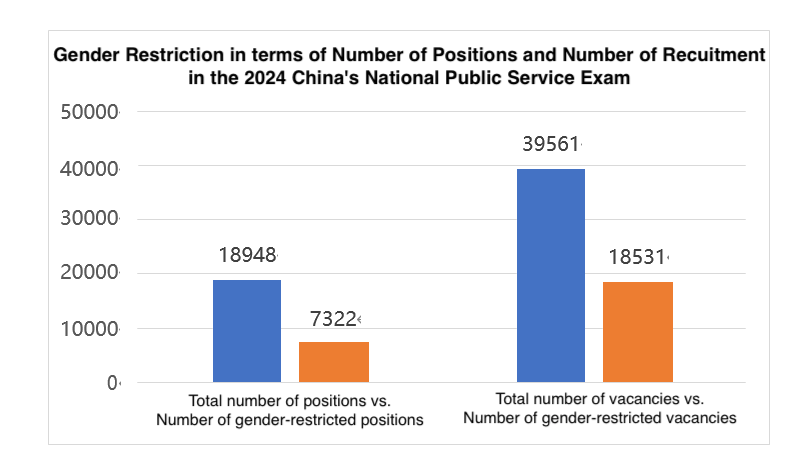
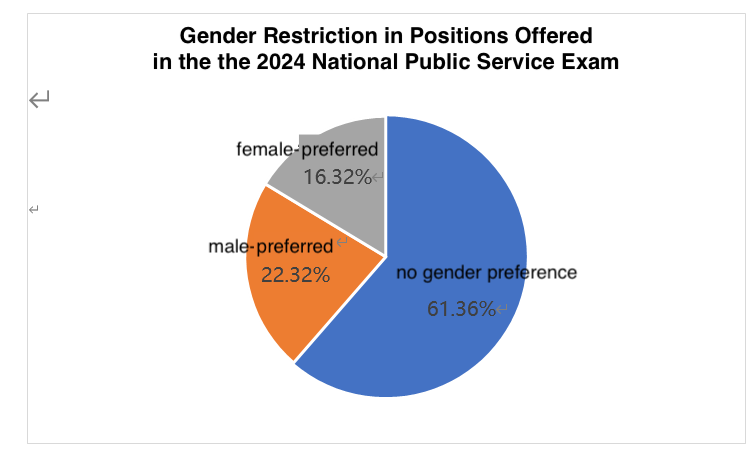
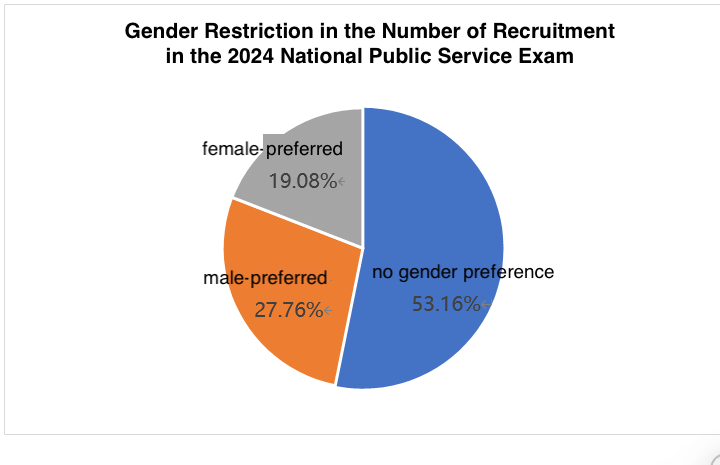
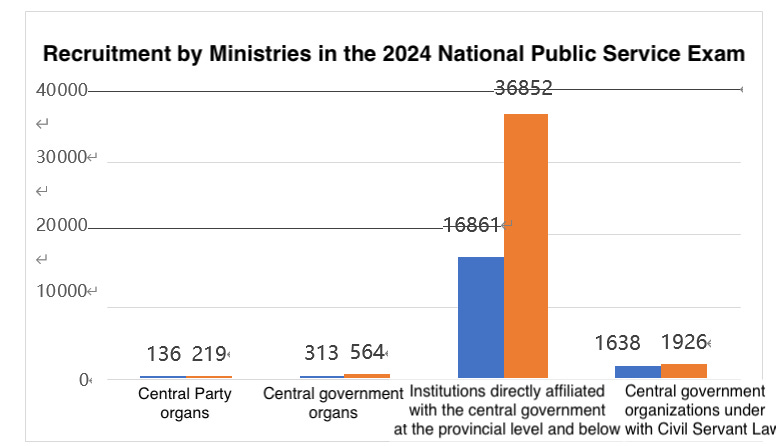
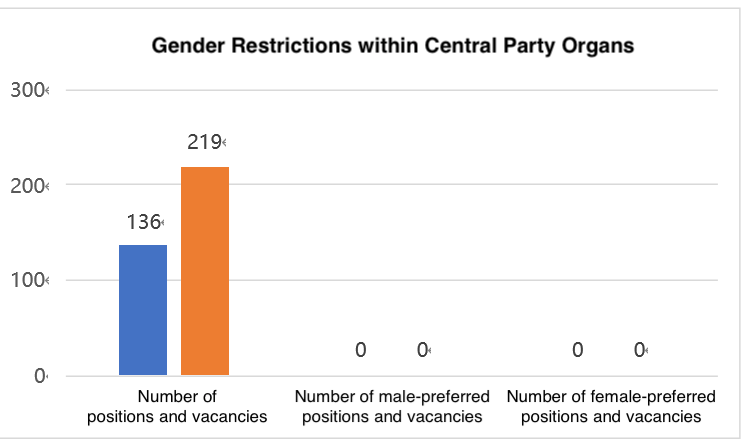
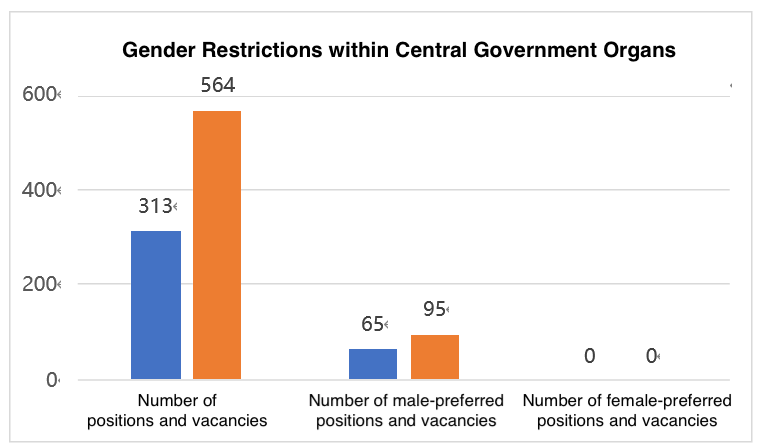
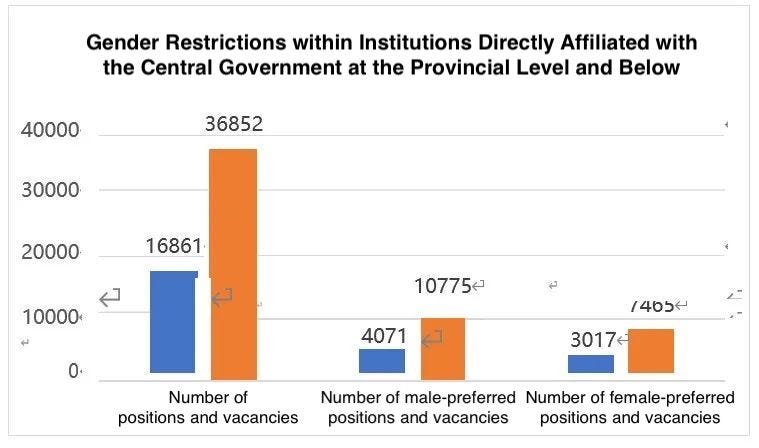
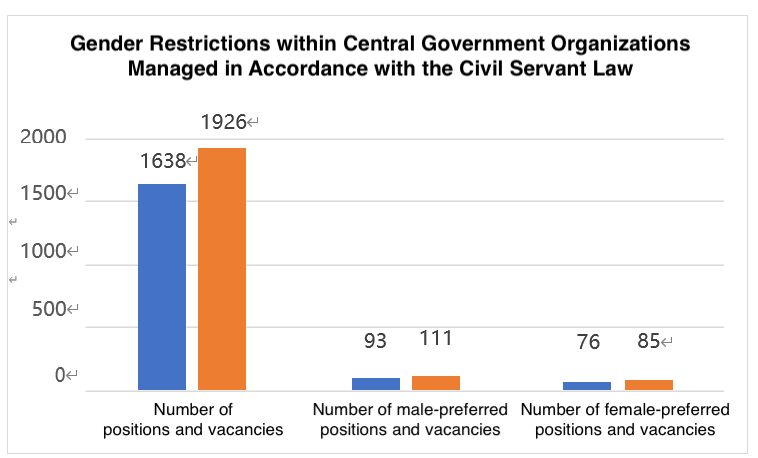

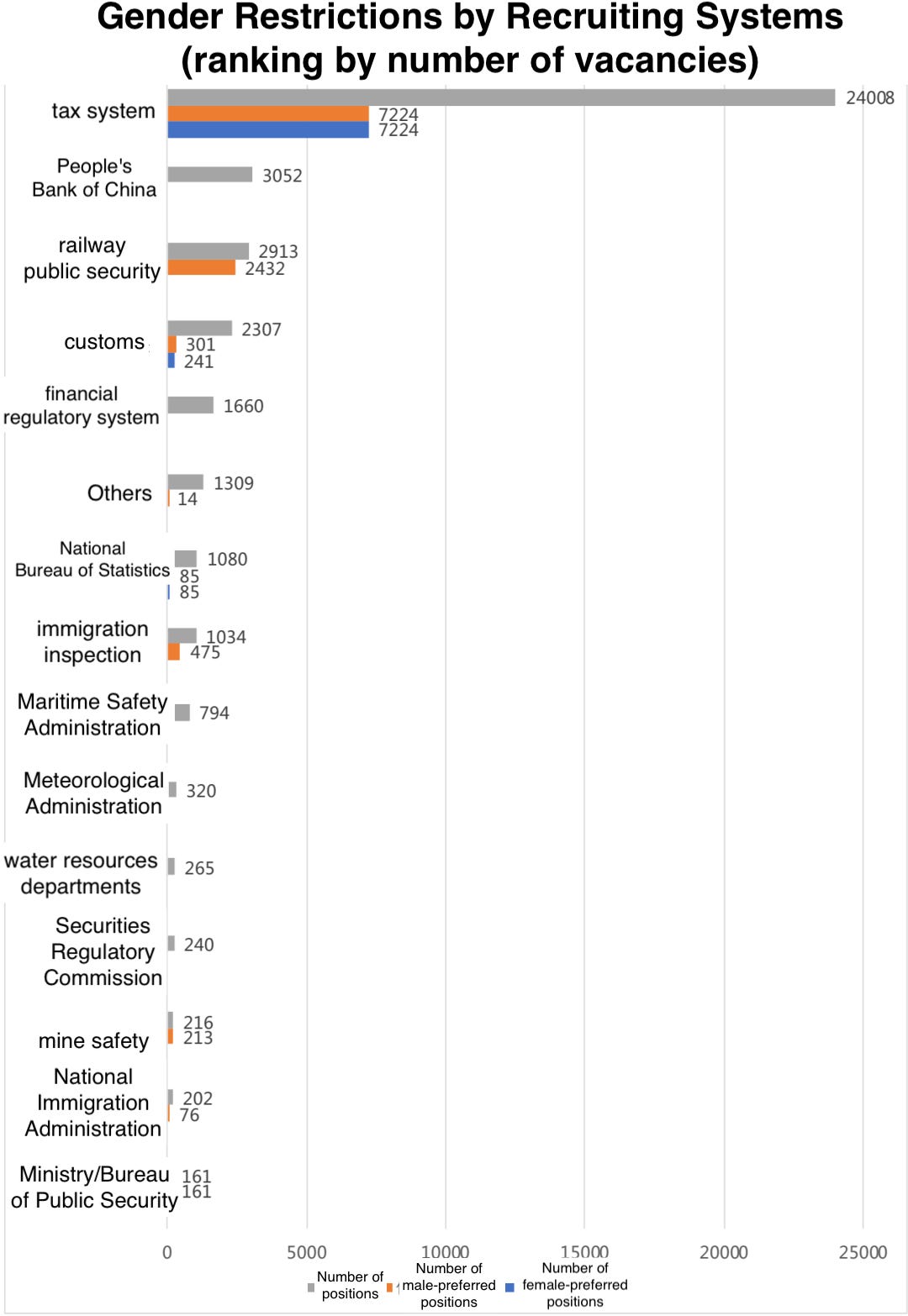
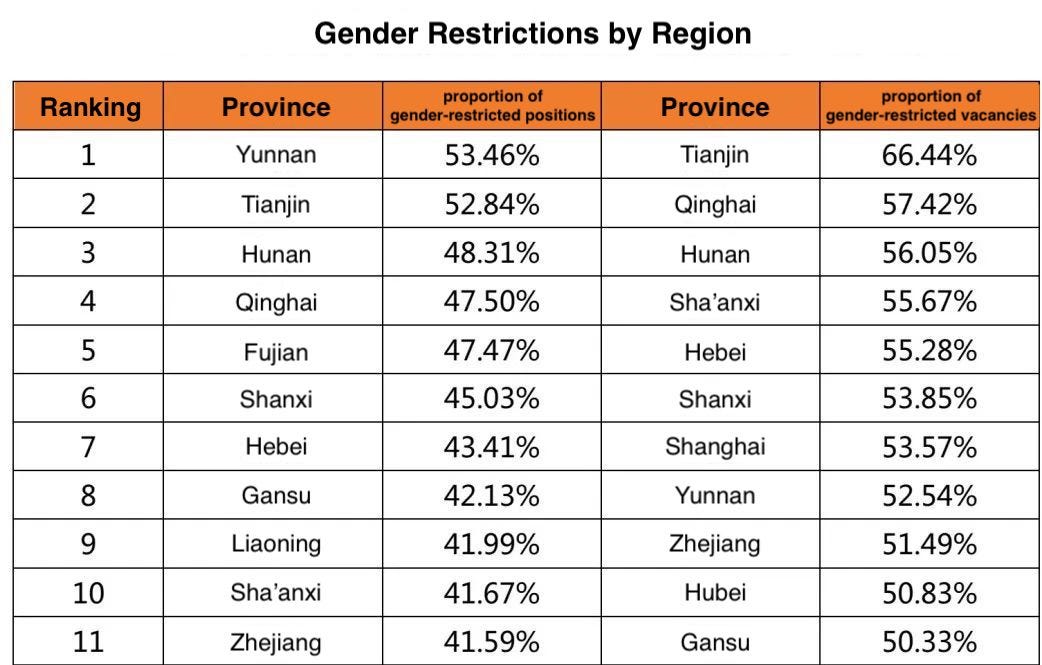
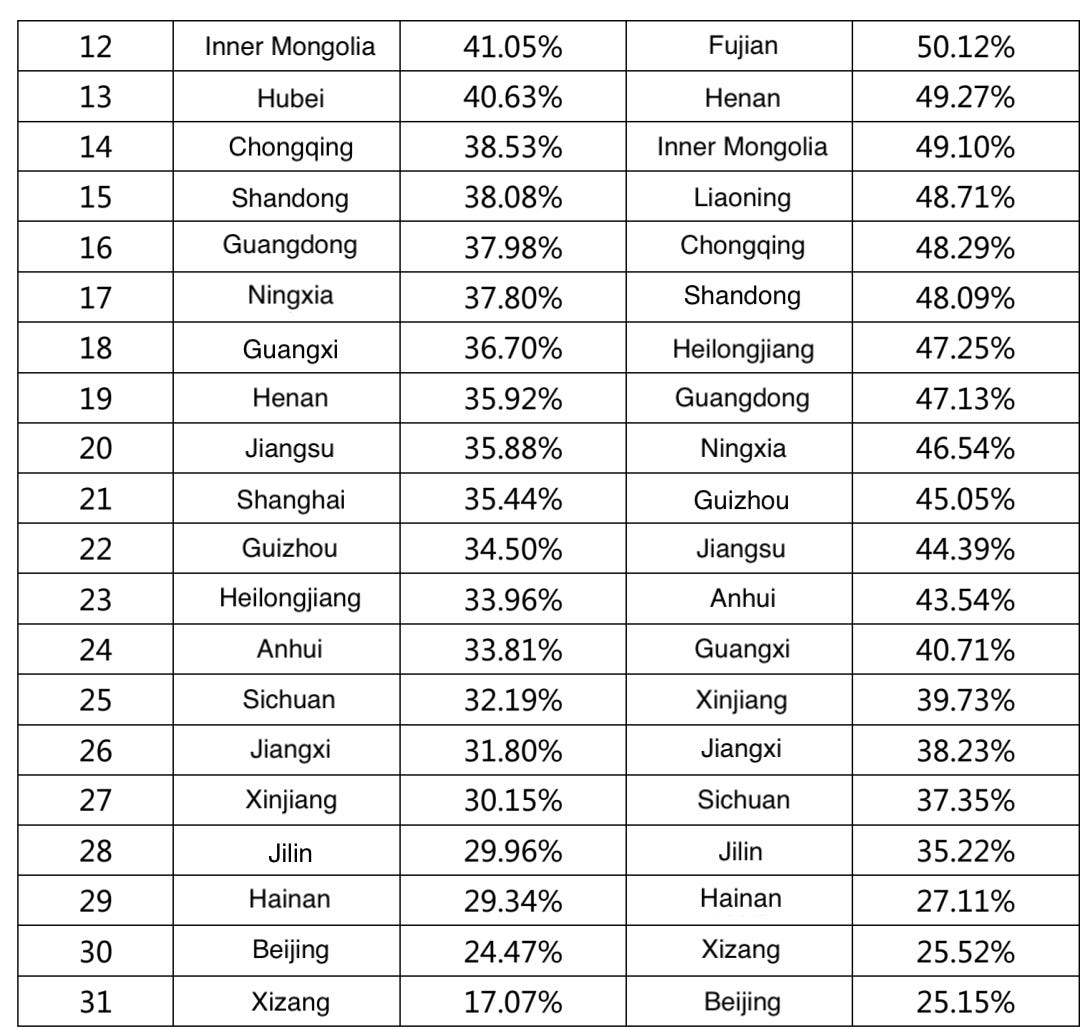




A great series! Many thanks!
Western readers should know that Chinese women (and men) don't 'go into politics' like they do in the West.
If you want a political career you must be in the top 2% of university graduates and willing to spend your first five years living in a dirt-poor, remote village with people who don't speak Mandarin and have no idea of what a university is...
No wonder grandmothers and mothers strongly discourage girls from political careers!
Girls in government choose tracks like research (where they win Nobel prizes), engineering, (designed a fleet of 80 missile patrol boats), or computing (built the world's fastest computer), SOEs (double the private sector salary for a 40-hour week) or venture capital (10x the number of partners are women in China vs. US).
Zhao Bing Bing, a mid-level official in Liaoning Province, explained the process to Daniel Bell:
"I was promoted in 2004 through my department’s internal competition (30 percent on written exam results, 30 percent on interviews and public speaking, 30 percent on public opinion of my work, and 10 percent on education, seniority, and my current position) and became the youngest deputy division chief. In 2009, Liaoning Province (pop. 44 million) announced an open selection of officials in the national media. Sixty candidates met the qualifications, the top five of whom were invited for further interviews. Based on their test scores (40 percent) and interview results (60 percent), the top three were then appraised. The Liaoning Province organizational department sent four appraisers who spent a whole day checking my previous records. Eighty of my colleagues were asked to vote–more than thirty of whom were asked to talk with the appraisers about my merits and shortcomings–and they submitted the appraisal result to the provincial Standing Committee of the CCP for review.
"In principle, the person who scored the highest and whose appraisals were not problematic would be promoted. However, because my university major, work experience, and previous performance were the best fit for the position, I was finally appointed department chief of the Liaoning Provincial Foreign Affairs Office even though my overall score was second-best [the government discriminates positively in promoting women–ed]. Before the official appointment, there was a seven-day public notice period during which anybody could report to the organization department concerns about my promotion. I didn’t spend any money during my three promotions; all I did was study and work hard and do my best to be a good person.
"In 2013, thanks to an exchange program, I worked temporarily in the CCP International Department. The temporary exchange system offers opportunities to learn about different issues in different regions and areas like government and SOEs. In a famous quote, Chairman Mao said, “Once the political lines have been clearly defined, the decisive factor will be the cadres [trained specialists]”. So, the CCP highly values organizational construction and the selection and appointment of specialists. There is a special department managing this work, The Organization Department, established in 1924, and Mao was its first leader.
The department is mainly responsible for the macro-management of the leaders and the staff (team building), including the management system, regulations and laws, human resource system reforms—planning, research, and direction, as well as proposing suggestions on the leadership change and the (re)appointment of cadres. Also, it has the responsibility of training and supervising cadres. The cadre selection criteria are: a person must have ‘both ability and moral integrity and the latter should be prioritized’. The evaluation of moral integrity focuses mostly on loyalty to the Party, service to the people, self-discipline, and integrity. Based on different levels and positions, the emphases of evaluation are also different. For intermediate and senior officials, the focus is on their persistence in faith and ideals, political stance, and coordination with the central Party. High-level cadres are measured against great politicians, and, among them, experience in multiple positions is very important".